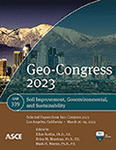Influence of Compaction Characteristics and Moisture Exposure on Resilient Moduli of Cement-Treated Soil
Publication: Geo-Congress 2023
ABSTRACT
The resilient modulus (MR) of subgrade soil is a key parameter for mechanistic-empirical pavement design of flexible pavements. Generally, MR is determined by conducting repeated load triaxial (RLT) tests in the laboratory and is used to characterize the subgrade soil behavior under repeated traffic loading conditions. This research study investigated the influence of compaction energy and moisture exposure on the resilient moduli of untreated and cement-treated cohesive soil. For RLT tests, untreated and cement-treated cylindrical specimens were prepared at respective optimum moisture contents and maximum dry unit weights, obtained from both standard and modified Proctor compaction tests. Compacted cement-stabilized soil specimens were cured in a humid room for seven days before they were subjected to RLT tests. Three-parameter universal model constants (k1, k2, and k3) were determined by performing statistical regression analysis on RLT test results. Test results indicate that the compaction energy has a major impact on both the resilient moduli and stress hardening/softening behavior of untreated and cement-treated soils. The untreated soil specimens of standard Proctor compaction energy exhibited stress softening behavior with an increase in deviator stress, whereas the untreated specimens with modified Proctor compaction energy exhibited stress hardening behavior. In contrast, the cement-treated specimens showed stress hardening behavior with an increase in deviator stress, irrespective of the compaction energy. This might be because specimens tend to get hardened when subjected to higher axial loading, which resulted in low axial strains and exhibited high resilient modulus. Results show a slight decrease in resilient moduli of cement-treated soil after 4 h of submerging in water.
Get full access to this article
View all available purchase options and get full access to this chapter.
REFERENCES
AASHTO. (2004). Mechanistic-Empirical Pavement Design Guide. AASHTO, Washington, D.C.
AASHTO. AASHTO T 307-99. (2017). Standard Method of Test for Determining the Resilient Modulus of Soils and Aggregate Materials. American Association of State Highway and Transportation Officials, Washington, D.C.
Abu-Farsakh, M., Dhakal, S., and Chen, Q. (2015). “Laboratory characterization of cementitiously treated/stabilized very weak subgrade soil under cyclic loading.” Soils and Foundations, 55(3), 504–516.
ASTM. (2019). Annual Book of ASTM (American Society for Testing and Materials) Standards. ASTM International, West, Conshohocken, PA.
Banerjee, A., Puppala, A. J., Congress, S. S. C., Chakraborty, S., Likos, W. J., and Hoyos, L. R. (2020). “Variation of Resilient Modulus of Subgrade Soils over a Wide Range of Suction States.” ASCE Journal of Geotechnical and Geoenvironmental Engineering, 146(9), 1–18.
Behnood, A. (2018). “Soil and clay stabilization with calcium- and non-calcium-based additives: A state-of-the-art review of challenges, approaches, and techniques.” Transportation Geotechnics, 17, 14–32.
Drumm, E. C., Reeves, J. S., Madgett, M. R., and Trolinger, W. D. (1997). “Subgrade Resilient Modulus Correction for Saturation Effects.” ASCE Journal of Geotechnical and Geoenvironmental Engineering, 123(7), 663–670.
Han, Z., and Vanapalli, S. K. (2016). “State-of-the-Art: Prediction of Resilient Modulus of Unsaturated Subgrade Soils.” ASCE International Journal of Geomechanics, 16(4), 04015104:1–15.
Kumar, P., Puppala, A. J., Tingle, J. S., Chakraborty, S., Sarat, S., and Congress, C. (2022a). “Resilient Characteristics of Polymer Emulsion-Treated Sandy Soil.” Transportation Research Record: Journal of the Transportation Research Board, 1–13.
Kumar, P., Tingle, J. S., Puppala, A. J., Chakraborty, S., and Congress, S. S. C. (2022b). “Permeability Characteristics of Polymer Emulsion-Stabilized Soils.” Geo-Congress 2022 GSP 331, American Society of Civil Engineers, 261–270.
Little, D. N., Males, E. H., Prusinski, J. R., and Stewart, B. (2000). “Cementitious stabilization.” Transportation in the New Millenium, 1–7.
Pinilla, J. D., Miller, G. A., Cerato, A. B., and Snethen, D. S. (2011). “Influence of Curing Time on the Resilient Modulus of Chemically Stabilized Soils.” Geotechnical Testing Journal, 34(4), 364–372.
Prusinski, J. R., and Bhattacharja, S. (1999). “Effectiveness of portland cement and lime in stabilizing clay soils.” Transportation Research Record, (1652), 215–227.
Puppala, A. J. (2008). Estimating Stiffness of Subgrade and Unbound Materials for Pavement Design. Transportation Research Board, Washington, D.C.
Puppala, A. J. (2016). “Advances in ground modification with chemical additives: From theory to practice.” Transportation Geotechnics, 9, 123–138.
Puppala, A. J., Ramakrishna, A. M., and Hoyos, L. R. (2003). “Resilient Moduli of Treated Clays from Repeated Load Triaxial Test.” Transportation Research Record, (1821), 68–74.
Puppala, A., Mohammad, L., and Allen, A. (1996). “Engineering Behavior of Lime-Treated Louisiana Subgrade Soil.” Transportation Research Record: Journal of the Transportation Research Board.
Seed, H., Chan, C., and Lee, C. E. (1962). “Resilience characteristics of subgrade soils and their relation to fatigue failures in asphalt pavements.” International Conference on the Structural Design of Asphalt Pavements, 611–636.
Solanki, P., Zaman, M. M., and Dean, J. (2010). “Resilient Modulus of Clay Subgrades Stabilized with Lime, Class C Fly Ash, and Cement Kiln Dust for Pavement Design.” Transportation Research Record, 2186, 101–110.
UFC 3-250-11. (2020). Soil Stabilization and Modification for Pavements. Department of Defence.
Witczak, M. W. (2003). Harmonized Test Methods for Laboratory Determination of Resilient Modulus for Flexible Pavement Design. Transportation Research Board, Washington, D.C.
Information & Authors
Information
Published In
History
Published online: Mar 23, 2023
Authors
Metrics & Citations
Metrics
Citations
Download citation
If you have the appropriate software installed, you can download article citation data to the citation manager of your choice. Simply select your manager software from the list below and click Download.
